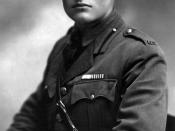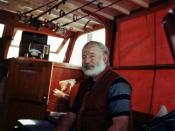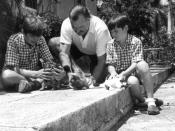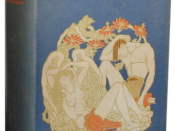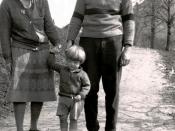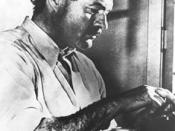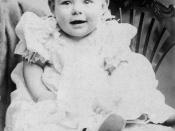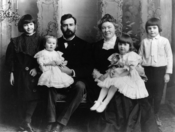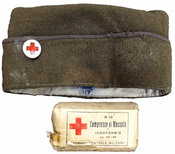Ernest Hemingway has been recognized as one of this centuries most unique writers. His style is sparse and definitive. He has been praised for his creative short descriptive sentences. In his loose autobiography, A Farewell to Arms, the sentences are full of simple nouns and verbs that don't whisper, rather they hammer details into the reader's subconscious. His words are the best possible word to use, most often, the simplest. With Hemingway's straightforward sentences, many critics site a major connection between his uncomplicated nouns and the symbolism they carry. Hemingway thoroughly enjoyed down-playing the idea of hidden symbolism in his books, as evidenced by his explanation of "Symbolismo," to a Cuban fisherman. After the release of The Old Man and The Sea, the local fisherman was confused by the word. Ernest enlightened the man by declaring, "Symbolismo, es un truco nuevo de los intellectuales." (Baker 506) He sincerely felt that critics and intellectuals placed too much emphasis on hidden meanings and the author's intent to use them.
Although whenever asked he would always reply with a quip about intellectuals and the over-emphasis on the symbolism he had intended for specific minute details, his writing is deeply symbolic, whether he meant it or not, because it is wonderfully universal and timeless. In order to recognize and appreciate any literary techniques Ernest Hemingway employs, the reader must be familiar with the story and its' characters. The novel is based mainly in Italy and revolves around Lieutenant Frederic Henry, an American in the Italian army. It is also set during the first World War. At the ambulance station where he is assigned, he meets a young nurse and continues to visit her from time to time. When Lt. Henry becomes injured while eating spaghetti in a bunker on the front-line, the novel's true plotline becomes evident. By being sent to a hospital in Milan, the door is once again opened on the budding romance of Lt. Henry and Catherine Barkley, the recently transferred, English nurse. Henry grows mentally and spiritually because of this relationship as the book progress's. Fredric tells us, "God knows I hadn't wanted to fall in love with her. I had not wanted to fall in love with anyone."(Hemingway 93) When they both meet in Milan.
Symbolism in this novel is evident in the first paragraph and continues heavily throughout the first chapter dealing mainly with weather. Rain carries the majority of the novel's symbolic significance. Rain is present whenever death occurs or is alluded to. In the first chapter Henry notes, "There was fighting for that mountain too, but it was not successful, and in the fall when the rains came the leaves all fell from the chestnut trees and the branches were bare and the trunks were black with rain." (Hemingway 4) Hemingway immediately connects rain with death by describing the dormant trees covered with rain. The fighting in the mountains is also included in the beginning of the sentence throwing the war into a negative connotation, although it is still only described from afar. The sentence directly after that, Henry mentions the vineyards, from which wine, a major part of his life, comes. The once fruitful fields are now barren and dead with the war and approaching autumn. The last paragraph of chapter one foreshadows the rest of the novel and the war, telling of worse times on the horizon, by telling of the winter's permanent rains and the cholera that comes with it. To further enforce the anti-war statement of this text, Hemingway laces the last sentence with irony and mentions in passing, "only seven-thousand died of it in the army." (Hemingway 4) In Book Two, Catherine reinforces the deep symbolism of rain by admitting to Henry that she has always been afraid of rain for no reason. In most literature, rain is used to represent moral cleansing. In A Separate Peace, Gene stands in the rain after returning to the school where Finny had died. When he comes in from the athletic field he says, "I felt clean and new," (Knowles It is possible that Hemingway chose to use rain in a negative connotation to further enforce the overall despair war creates. Rain makes the roads and plains muddy and unusable, evidenced during the retreat from Caporetto. The trucks become bogged down in the thick mud and the two sergeants attempt to flee rather than help. Lt. Henry shoots one of the sergeants after he orders them stop and return to the ambulances. This is the most graphic depiction of the madness that results from war. It is in this excerpt that Hemingway brings the reader closest to the grainy, unflattering image of the war he paints throughout the book.
